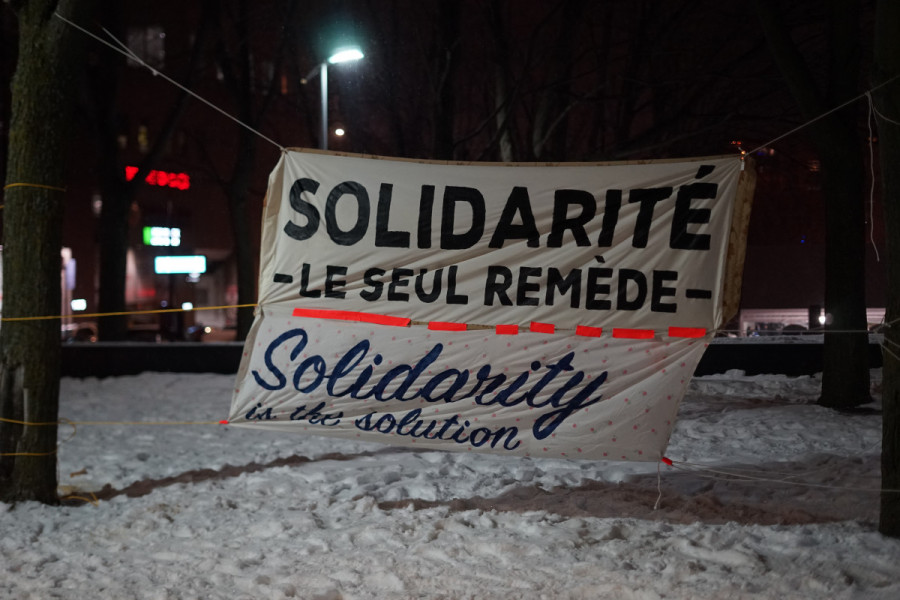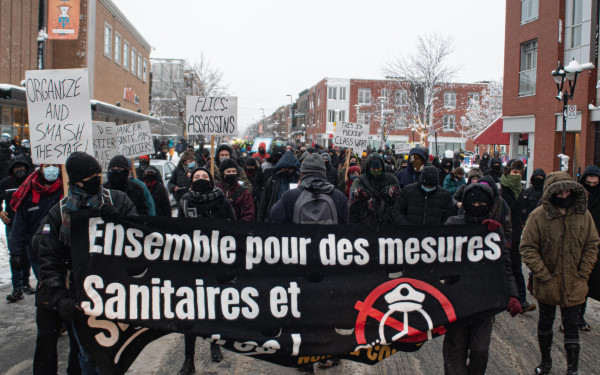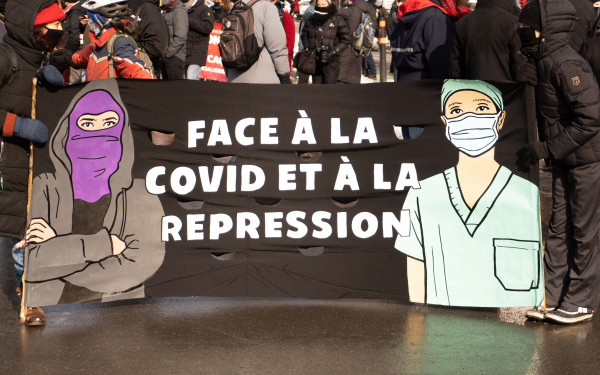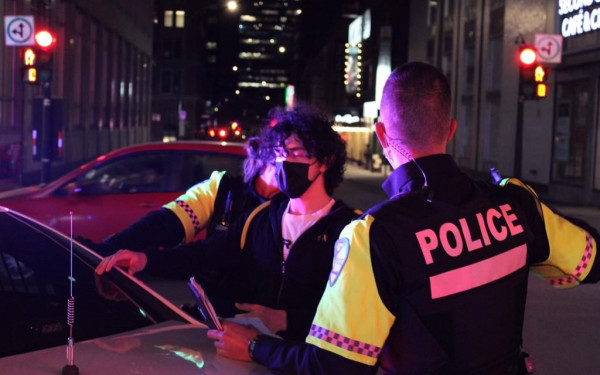Activists denounce curfew: ‘You can’t police a pandemic’
Speakers demand an approach based on solidarity, not repression
Community organizers and activists opposing the Legault government’s curfew held a press conference at Place Émilie-Gamelin on Jan. 11 to voice their concerns regarding the measure’s effect on vulnerable groups.
The meeting was held right across the street from the Place Dupuis Hotel, which was recently repurposed as a homeless shelter. Many were gathered outside, waiting to get in. The organizers stressed the event was for the media, and not a protest, though a small crowd of onlookers gathered.
“We are well aware of the tragic impact of this pandemic,” said Dr. Nazila Bettache. “Everyday we see suffering, the dead, the victims—counted and uncounted. We also see the suffering of our colleagues, their distress,” she added, describing a healthcare system stretched thin after years of austerity measures.
“It’s a lot easier to self-isolate in Westmount than in Parc-Ex. It’s easier to self-isolate when you work from home than when you are precariously employed, or work in a factory. It’s easier to self-isolate in a single family house than a three-and-a-half,” said Bettache, highlighting how people with lower means have suffered the brunt of this pandemic.
The negative impact the curfew will have on marginalized populations whose suffering has been exacerbated by the pandemic was the key message. The main concern was for the welfare of those who cannot find shelter in time for curfew.
Legault claimed that there are enough beds in shelters to accommodate everyone, a claim disputed by many on the ground. Even if there are enough beds, shelters aren’t an option for everyone and, with numerous outbreaks, could be more dangerous than the streets.
“I'd just like people to understand that if you or your family wouldn't go and stay at the shelter, we shouldn't be having those shelters,” said Jessica Quijano from the Native Women’s Shelter.
Also highlighted were the potential dangers to Black, Indigenous, and People of Colour who could see themselves increasingly criminalized by a police force with a long history of discrimination.
“I know through experience, and we know this, the research says you cannot police a pandemic,” said Quijano. She pointed to the AIDS crisis as evidence of an ongoing failure to tackle a pandemic by resorting to policing.
“They ask us to trust the judgement of police officers,” said Emmanuel Cree, who does outreach work with the community group REZO. “Let’s say in March and April of last year, it didn’t look too good.”
Tickets have already been handed out to homeless people in Quebec, as well as some essential workers commuting home past curfew despite them having an authorization letter from their employer.
Cree highlighted how sex workers, who’ve been deeply affected by the pandemic with little government help available to them, will further be hurt by the curfew. He also worries about an increase in criminalization of drug users, giving the example of someone wanting to go to a safe injection site past 8 p.m. and risk being caught by the police.
“For someone living on the street in a pandemic in January in Quebec, a $1,000 fine for being homeless is a cruel punishment,” said lawyer Arij Riahi.
Along with calls to abandon the curfew were calls for increased measures across the board for Montreal’s most at-risk residents.
“Give people the means to isolate themselves, to get tested, to access healthcare. That’s what we think the solution is—more solidarity, not more repression,” said Bettache.
Nakuset, the director of the Native Women’s Shelter, called out all levels of government for not doing enough to help the city’s most vulnerable during the second wave. She asked the mayor to declare a state of emergency, as was done in March last year. Nakuset also suggested bringing in the army or the Red Cross to help.
“As settlers here in Tiohtià:ke, we kind of expect that you're going to do a little bit better,” she said.






